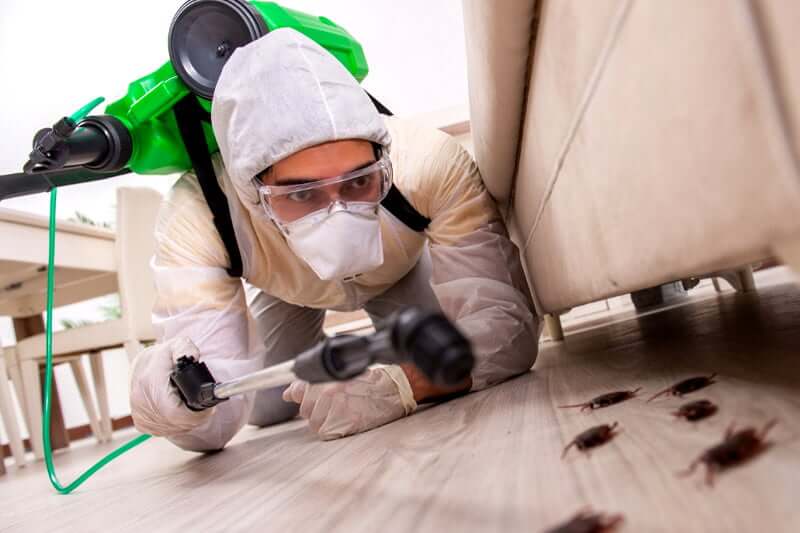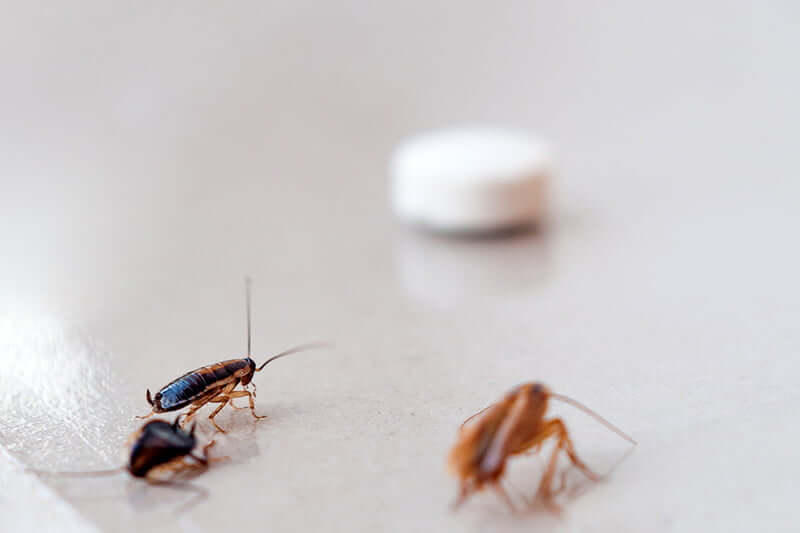It is very difficult to get rid of roaches due to their high resistance to pesticides. If you’re trying to eliminate them yourself, there’s a high chance that you can’t wipe them out completely, so they’ll resurface after a very short time.
If you hire a professional pest control company, they will ensure to carry out complete extermination using a combination of methods. Exterminators typically spray special chemicals that will kill the roaches, set bait stations, and do timely checks until the roaches are completely eliminated.
The strategies used by exterminators to get rid of cockroaches are explained in this article.

Gel bait
Gel baits are one of the most effective ways of eliminating cockroaches. This explains their wide adoption by pest control experts.
These gels contain various insecticides and are packed in a handy syringe. This syringe makes it easy to apply small amounts of the gel anywhere roaches lurk around your home, such as in cracks and crevices.
The roaches will eat the gel bait and die shortly afterward. Once the bait has killed a cockroach, many other roaches will feed on the bodies of the dead ones and equally get poisoned by the insecticide. This trend will continue until several generations are completely wiped out.
Tent fumigation
Tent fumigation is often used as a last resort when roach infestations become unbearable. The chemicals used in fumigation are those effective against cockroaches and their eggs because they are so potent and will reach everywhere, including cracks and crevices.
However, fumigation is not only expensive, but can be hazardous to humans and pets, so it is often used as a method against severe cockroach infestations when all other options are exhausted. After fumigation, you should allow a minimum of 1 – 7 days before moving back into the home.
What chemical do pest control companies use for cockroaches?
Pyrethrin and pyrethroids
Pyrethrin and pyrethroids are pesticides widely used by exterminators. They are the active ingredients found in sprays by licensed pest exterminators. This chemical pesticide effectively eliminates roaches because it paralyzes them and leads to their death. Pyrethrin and pyrethroids are derived from chrysanthemum flowers known to be good repellers of pests. These chemicals are included in most pesticides that are sprayed on properties. They are non-toxic to humans and animals, so spraying them on your property will not have any severe effect.
It also does not trigger allergies and asthma that some may have. However, using Pyrethrin and pyrethroids is not advisable if you have pets like fish because they can pose a great danger when they get into the water.
Piperonyl butoxide
Piperonyl Butoxide is another pesticide used by exterminators. It is a famous chemical found in pesticides or sprays that are used to eliminate pests. Piperonyl butoxide cannot work alone, so it is combined with pyrethrin and other chemicals to make it more effective. The chemical’s toxicity to humans and animals is mild but high exposure may be harmful. Exterminators always take safety precautions in your home to ensure that it will not cause any risks to you.
Fipronil
Fipronil is a standard pest control chemical used for roaches and it can come in the form of liquid or powder. It affects the nervous system of pests and will either kill them or repel them from your home. Fipronil is a mildly toxic spray that should only be used by professional pest control technicians. Whenever it is used, they need to keep you and your family aware of the affected areas.
Boric acid
One of the most common pesticides used is boric acid. This is known to everyone because it is applied not only to pests but for other purposes. Boric acid can be in pellet and powder form and it is cheap.
This chemical is used in sprays so when this is turned into spray, it helps in eliminating pests like ants, termites, and cockroaches. It can be applied on surfaces where roaches are present, so it is easier to use when you have pests. However, boric acid should be used cautiously because it can impose hazards on humans and animals.
Indoxacarb
Indoxacarb is a pesticide applied to pests that is effective if you have cockroach infestations at home. Exterminators may also use indoxacarb which will help in eradicating cockroaches since the chemical once applied can be spread. With this, if cockroaches can get in touch with dead ones or feces, they can also acquire the chemical that will kill them. It will not only kill the cockroaches you have now, but it can even get rid of new generations of cockroaches.
Hydramethylnon
Hydramethylnon is an organofluorine compound that belongs to a chemical class called trifluoromethyl aminohydrazone. It is thus a metabolic inhibitor.
Hydramethylnon is a pesticide designed to control insects and used primarily as an insecticide in the form of baits for cockroaches. It is a slow-acting poison with delayed toxicity that is effective once ingested.
Examples of insecticides that have hydramethylnon as the active ingredient are Amdro, Blatex, Combat, Cyaforce, Cyclon, Faslane, Grant’s, Impact, Matox, Maxforce, Pyramdron, Siege, Scuttle, and Wipeout. Hydramethylnon is characterized by low toxicity in mammals.
Roach bait often uses hydramethylnon since it only takes effect once ingested and is highly effective against German roaches.
DIY roach removal
The most effective DIY treatment for roaches is Cockroach bait. It is priced between $10 and $20. These bait stations or liquid gel baits kill roaches and prevent them from returning.
Cockroach spray is another popular one that kills the roaches on contact. The average cost for cockroach sprays is between $5 and $10. While it is very effective on contact, roach spray isn’t an effective solution like gel bait.
While DIY cockroach treatment can be a suitable solution for a few roaches, you may not be able to face it alone with large infestations.

Using an Exterminator
Hiring an exterminator for roaches is usually required to get full control of an infestation. Here are some actions professionals will take to help eliminate the pest from your home:
- Inspect all areas of your home for signs of roaches
- Create an actionable treatment plan based on your specific problem
- Safely handle chemicals and other pesticides
- Keep you informed throughout the entire process
- Return to your home for follow-up visits as needed
Professional exterminators near you
If you want to prevent or control roach infestation on your property, feel free to use GoTreeQuotes. It offers a free service that quickly matches you with the top-voted pest control experts in your area.
Using the website, you can get 3 estimates fast by real certified experts in your area in just 2 minutes. Here is how it works.
- You scroll to the top of the page and enter your Zip code.
- Answer questions about your roach control job
- Your details will be forwarded to three local experts.
- You will then receive a price estimate for the job and some friendly advice.
IMPORTANT: There is no obligation to hire. This is a free tool and service to be used at your pleasure.

How long does it take for an exterminator to get rid of roaches?
The time it takes for professional cockroach extermination can vary greatly due to the extent of the infestation. It can take a few minutes or up to several hours. The factors that determine the length of time are many. Some of them are the level of infestation, the size of your house, and the number of exterminators present.
Preventive treatments on the other hand are generally shorter, taking about 15 to 30 minutes, while removals and exterminations can last the better part of a day.
How long does it take for extermination to kill pests?
It’s a different thing to introduce pesticides to your home, it’s another thing to confirm the effect of the pesticides. You may still see a few cockroaches around your home after treatment. Some of them will die off and other ones will migrate out of your property.
For ineffective methods, one or two roaches may stay alive and they may reproduce and start another infestation. It takes two to eight weeks to confirm if the treatment has actually taken effect and you may then continue to enjoy your home.
How long do you have to stay out of your house after pest control?
Depending on the method employed and the insecticide used, some approaches can require that you stay away from a particular room for 30 minutes and some will require an extended period.
How often should pest control be done in an apartment?
After your apartment is treated, most professional exterminators will set up a treatment schedule to prevent pests from coming back. Some of them will visit every two to three months, but monthly treatment may be required if it’s a severe case. This has less to do with how long insecticide lasts after spraying and depends on getting populations under control.
When to call an exterminator for roaches
If you see a single roach in your home, it could just be a loner that strayed away from its colony. However, you may likely end up with a cockroach infestation after that.
When you start to see a lot of cockroach droppings, egg cases, or dead cockroaches, throughout your house, then it’s probably time to call an exterminator.
You can start a DIY pest control treatment using baits that you bought from your local grocery store and this could help kill off some roaches. Meanwhile, you may not be able to get rid of the whole colony if the infestation level is high. More so, if there are a lot of hard-to-reach places in your home.
How much does an exterminator cost for roaches?
You can expect to pay between $100 and $400 for a single cockroach treatment, which can go as high as $6,000. The average exterminator cost for roaches is around $150. Factors such as the level of infestation, the size of your home, and the treatment method will determine the cost of extermination for your roach treatment.
For effective pest treatments, you can plan for a pest control company to spray for cockroaches on a seasonal basis or even monthly or bi-monthly basis. If you sign up for an annual treatment plan, most treatments will typically cost around $75.
Factors that affect roach extermination pricing
The cost of cockroach extermination is influenced by a variety of factors, including the square footage treated, the treatment type, and the severity of your infestation.
Square footage of your home
The size of your home is a major determining factor in the extermination process. For example, the more square footage an exterminator treats, the more you can expect to spend on treatment.
Treatment Type
Different pest treatment types require different materials and will come at different costs. The type of pest treatment used by the exterminator will determine the cost you’ll pay for the service.
Severity of Infestation
The infestation level of roaches you’re currently experiencing in your home will determine the extent of treatment required. This will have an effect on the extent of work and the cost of extermination for your roach treatment job.
What to expect after an exterminator sprays for roaches
After professional cockroach extermination, you should see a reduction in cockroaches and the signs of infestation. Here is what to expect after the extermination.
- Meanwhile, you shouldn’t be surprised if you’re still seeing a few roaches around. They’re likely fleeing from your property.
- Cockroach pest control treatments often take time for effect, and may not always kill the roaches outrightly. Some roaches will survive but will likely find the quickest way out of your property.
- You may even start to see roaches during the daytime and they may be more than you’ve been seeing before. Don’t fret. The treatment is taking effect. It’s likely because they’ve been repelled by the pest treatment and their nesting and living habits have been disrupted.
- If there seems to be no significant effect after a series of pest treatments, you can contact your local pest control services to discuss your concerns.
- Sometimes you may start to see baby cockroaches some days after the treatment, it’s because some of their eggs have escaped treatment. Since the life cycle of a typical cockroach takes about 100 days from egg to adult, babies may still be hatching during your cockroach treatment. Treatment will likely work on them after the hatching, and they’ll just as well leave their nest for a safer place than your home.
How to tell if roaches are dying
If you see cockroaches in abnormal places away from nooks and crannies, they are likely confused and trying to flee. Also, if they’re moving about slowly, pest control treatments are taking effect.
How long should fumigation last?
If your exterminator is using the tent fumigation method, you should plan to be out of your house for 3 days to a week. Effective fumigation typically lasts four years, but it would be good to have a roach inspection every two to four years to keep your home protected. You should always be proactive and look out for any sign of infestation all the time before the infestation gets out of hand.
What to do after an exterminator treats your home
When it comes to treating your home for cockroaches, preventive measures are as important as the treatment. This will make the pest control measures have a long-lasting effect on your home.
Even if some of the chemicals used are safe for humans, you don’t want to expose all your family members to chemicals several times a year. Some of the ways to ensure that the treatments have long-lasting effects are;
Do not clean treated areas
Immediately after your pest control treatment, you should not do a deep cleaning of the treated areas so you don’t disrupt the treatment process. It usually takes a bit of uninterrupted time for the roach solution to take effect.
Remove food source and other triggers
It is important to remove triggers such as loose crumbs, open food containers, or trash containers – this is to ensure that they don’t move their nest to another area inside your home.
Restrict water sources
Roaches affected by pest control treatment can survive the treatment if they come in contact with any water source as they migrate. They will gravitate toward any safe water source they can find, including showers, bathtubs, sinks, etc. Restricting any possible sources of water will make the treatment have a significant effect.











